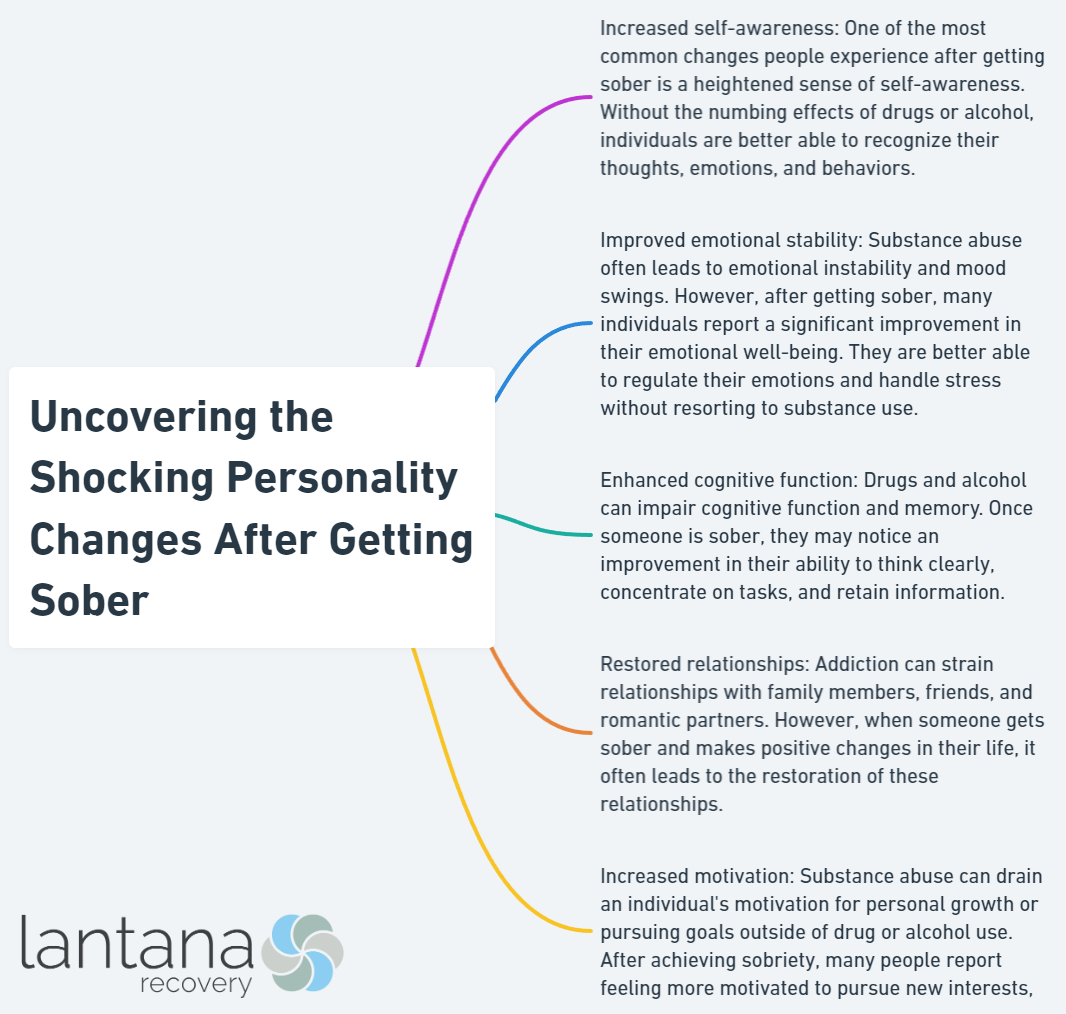Imagine a life where you’re in control of your emotions, have a thriving social circle, and experience personal growth in ways you never thought possible. That’s what sobriety can offer. Quitting alcohol can be a life-changing and transformative experience, opening up a world of opportunities for self-improvement and stronger relationships. In this blog post, we’ll uncover the shocking personality changes after getting sober, from the transformation of your social life to the restoration of your brain chemistry.
Ready to embark on this incredible journey? Let’s dive in and explore the benefits of sobriety and how it can shape your life for the better.
Short Summary
- Say goodbye to old drinking buddies and open yourself up to meaningful relationships & activities that bring you joy.
- Build a supportive network of sober friends for enhanced well-being and coping skills.
- Quitting alcohol can have positive impacts on your brain chemistry, cognitive abilities & emotional stability, and unlock potential for personal growth!
The Transformation of Your Social Life
As you begin your journey to sobriety and it gets easier, you’ll notice a shift in your social life. While it may involve saying goodbye to old drinking buddies, it also opens up thrilling opportunities for forming meaningful relationships and engaging in activities that bring you joy. Imagine building deep connections with people who genuinely care about your well-being, rather than just sharing a drink together.
Distancing yourself from old drinking buddies can be a powerful step towards maintaining long-term sobriety, especially when heavy drinking was a common activity. But rest assured, you’re not alone. Embrace this transformation, and you’ll discover how quitting alcohol and making a decision to stop drinking can create a more fulfilling social life.

Building a Supportive Network
Having a supportive network of sober friends is an invaluable asset in achieving long-term recovery success. A strong support system can lift feelings of isolation, provide comforting support, and offer useful advice during alcohol withdrawal.
So, how can you build such a network? Start by attending support groups, engaging in sober activities, and connecting with other sober individuals. Be open and honest about your recovery journey, and be willing to accept help from others. This will not only lead to increased well-being and enhanced coping skills, but also pave the way for a longer, healthier life.

Navigating Social Events
Maintaining sobriety during social events can be challenging, especially in the early days of recovery. But fear not – you can still have a successful and enjoyable experience without alcohol. First and foremost, prioritize your sobriety above all else. Be aware of what can cause you to drink and be mindful of your limits.
Having an exit plan in place can be a great strategy for attending social events during early recovery. Additionally, bringing a sober friend along can add to the enjoyment and provide much-needed support.
Remember, communication is key. Open up about your experiences, including physical withdrawal symptoms, and you’ll find that making meaningful connections in sobriety is not only possible but also rewarding.
Emotional and Mental Health Shifts

Quitting drinking can have a profound impact on your emotional and mental health. You might face feelings of loss, boredom, and grief, as you confront the reality of life without alcohol. On the other hand, sobriety can also bring about improved mood stability and decreased anxiety. Don’t worry, these emotional shifts are a normal part of the recovery process.
“Early recovery from alcohol use disorder (AUD) is commonly associated with high levels of negative affect, stress, and emotional vulnerability, which confer significant relapse risk” (Emotional differential in early recovery from AUD, Emery et al., 2022.) It’s important to be aware of the possible symptoms of depression, such as feeling sad or hopeless, loss of interest in activities, and difficulty concentrating. Recognizing these symptoms will help you understand the emotional and mental health shifts that occur after quitting drinking and empower you to seek the support you need.
Dealing with Mood Swings
Mood swings are common during early recovery, as you adjust to a new way of coping with emotions without substances. So, how can you best handle these fluctuations? Focusing on gratitude can be incredibly beneficial, as it helps shift your perspective and find joy in the little things.
Therapy and taking medications prescribed by professionals can help replace feelings of moodiness with happiness and fulfillment. Making healthy changes to lifestyles and seeking ongoing counseling from institutions like Lantana Recovery can also yield positive results. Cognitive-behavioral therapy (CBT) can also be a powerful tool to help you manage triggers and mood swings in your recovery journey.
Remember, honesty and taking ownership of mistakes are essential to staying true to yourself and keeping your spirits high during recovery.
Addressing Underlying Mental Health Issues
Addressing underlying mental disorders, including substance use disorder, is an essential part of achieving and sustaining sobriety in addiction recovery. Setting personal recovery goals and learning healthy coping mechanisms are crucial steps in tackling these issues.
Seeking professional help and treatment can be invaluable in managing mental health issues and staying sober. Working with a therapist can help you build strong and effective coping skills, and gain control over your mental health. Remember, it’s crucial to communicate and seek help when needed to ensure you have the assistance and resources necessary to stay sober.
Improved Self-Awareness and Personal Growth

Sobriety can enhance self-awareness, helping you understand the root causes of your addiction and triggers. This newfound clarity allows you to reclaim control over your environment and emotions, leading to better judgment and relationships. Additionally, sobriety can lead to enhanced empathy and self-esteem by providing a clearer understanding of yourself and your emotions.
To further boost your self-awareness, try practicing mindfulness, yoga, reflection, journaling, and seeking feedback from those you trust. These activities will not only help you grow personally but also strengthen your commitment to sobriety.
Developing Coping Skills
Developing healthy coping skills can empower you to replace alcohol use with healthier ways of managing stress and emotions. So, how can you develop these helpful coping skills in sobriety? Focus on practicing mindfulness, establishing healthy boundaries, connecting with others, and keeping a daily journal.
Additionally, finding gratitude and seeking professional therapy from experts in Columbia at Lantana Recovery can help you stay dedicated to your recovery and give you a sense of purpose and direction. Remember, communication and seeking help when needed are essential for a successful recovery journey.
Embracing New Hobbies and Interests
Embracing new hobbies and interests in sobriety is a fantastic way to discover new activities and interests that can help you grow and develop on your sobriety journey. Exploring different hobbies and activities that spark your interest, like joining a sports team, painting, or volunteering, can be beneficial in maintaining your sobriety.
Reconnecting with nature can also help reduce stress and anxiety, boost mental clarity, and provide a sense of peace and relaxation. Moreover, engaging in hobbies that allow you to meet new people can be incredibly rewarding, helping to build a supportive network, providing a sense of belonging, and combating feelings of loneliness and isolation.
The Impact of Sobriety on Relationships

Sobriety can bring about many positive changes in relationships, such as improved communication and increased trust. However, it can also reveal any underlying issues that may have been hidden by substance use. As you progress in your sobriety journey, you’ll find that your relationships with family, friends, and romantic partners will evolve.
The key to fostering healthy relationships in sobriety is honest communication, setting clear objectives, and avoiding toxic people. As you become more self-aware and emotionally stable, you’ll be able to build stronger connections with those around you.
Strengthening Family Bonds
Sobriety can lead to improved communication and stronger connections within families. Establishing good communication in sobriety means being honest and open with family members, truly listening to their concerns, and expressing your own feelings. This will help build trust and understanding with those around you.
To further strengthen family bonds, spend quality time together and create traditions that involve family in your recovery. Activities such as family dinners, game nights, and attending recovery meetings together can be great ways to bond and support each other on this journey.
Nurturing Healthy Romantic Partnerships
Sobriety can lead to a greater level of trust and emotional closeness in romantic relationships. As you and your partner grow together in sobriety, you’ll have the opportunity to explore deeper levels of intimacy, recognize codependency, and strengthen the bond between you.
Fostering healthy romantic partnerships in sobriety requires dedication, honesty, and, if needed, attending couples counseling. By working together, you and your partner can navigate the challenges of sobriety and build a stronger, more fulfilling relationship.
Changes in Brain Chemistry and Function

Not drinking and staying sober or quitting alcohol can have a significant impact on your brain chemistry and function. The frequency and amount of alcohol consumption determines the level of effects on the brain. It can range from mild impairment to severe damage. However, the amazing benefits of quitting alcohol on the brain include reinstating the brain’s natural function, boosting serotonin production, and enhancing cognitive abilities and decision-making.
As you progress in your sobriety journey, you’ll begin to notice improvements in memory, focus, and problem-solving skills. These enhanced cognitive abilities will not only help you stay sober but also improve your daily life.
Restoring Neurotransmitter Balance
When you quit drinking, your brain begins the process of restoring neurotransmitter balance, including dopamine and serotonin levels. The reward system in the brain gets switched on, and dopamine levels skyrocket when we drink alcohol. It may take a bit of time, but don’t give up! Your brain’s dopamine production will return to pre-drinking levels in around 90 days.
As your neurotransmitter balance is restored, you’ll experience fewer mood swings and a greater sense of emotional stability. This newfound balance will be crucial in maintaining your sobriety and embracing a fulfilling, alcohol-free life.
Enhanced Cognitive Abilities
Sobriety can bring about remarkable improvements in memory, focus, and problem-solving skills. To maximize your cognitive abilities while living soberly, engage in stimulating activities, take care of your physical health, manage stress levels, and even play some games.
With enhanced cognitive abilities, you’ll be better equipped to handle the challenges of daily life and make well-informed decisions. Sobriety not only frees you from the constraints of alcohol dependence but also unlocks your true potential for personal growth and success.
Summary
In conclusion, getting sober can have a profound impact on your life, from transforming your social circle to improving your emotional and mental health. The journey to sobriety is a lifelong process, filled with challenges and triumphs. As you continue to grow and develop, you’ll discover the amazing benefits of sobriety, such as enhanced self-awareness, personal growth, stronger relationships, and improved brain function.
Embrace the life-changing journey of sobriety and uncover the incredible person you were always meant to be. The path may be challenging, but the rewards are undoubtedly worth it.
Frequently Asked Questions
What are your emotions like after getting sober?
Getting sober can be tough, as it can leave you feeling overwhelmed by emotions. You may feel like you’re on a roller coaster with no control over how you feel. However, staying sober will help you find healthy ways to cope and progress through difficult emotions.
What is sobriety anhedonia?
Sobriety anhedonia is the inability to experience pleasure after getting sober, a common phenomenon experienced by many people in recovery from addiction.
This condition can be difficult to cope with, as it can lead to feelings of depression and anxiety. It is important to remember that sobriety anhedonia is a normal part of the recovery process and that it is possible to recover.
How long does it take for your mood to stabilize after quitting alcohol?
It typically takes 3-6 weeks for your mood to stabilize after quitting alcohol – and if it doesn’t, talk to your doctor right away.
How can I build a supportive network in sobriety?
Build your support network by attending support groups, engaging in sober activities, and connecting with other sober individuals. Share your story openly and honestly, and be willing to accept help when offered.
What hobbies and activities can I explore in sobriety?
Find a new adventure in sobriety through activities like joining a sports team, painting, volunteering, or exploring nature.









